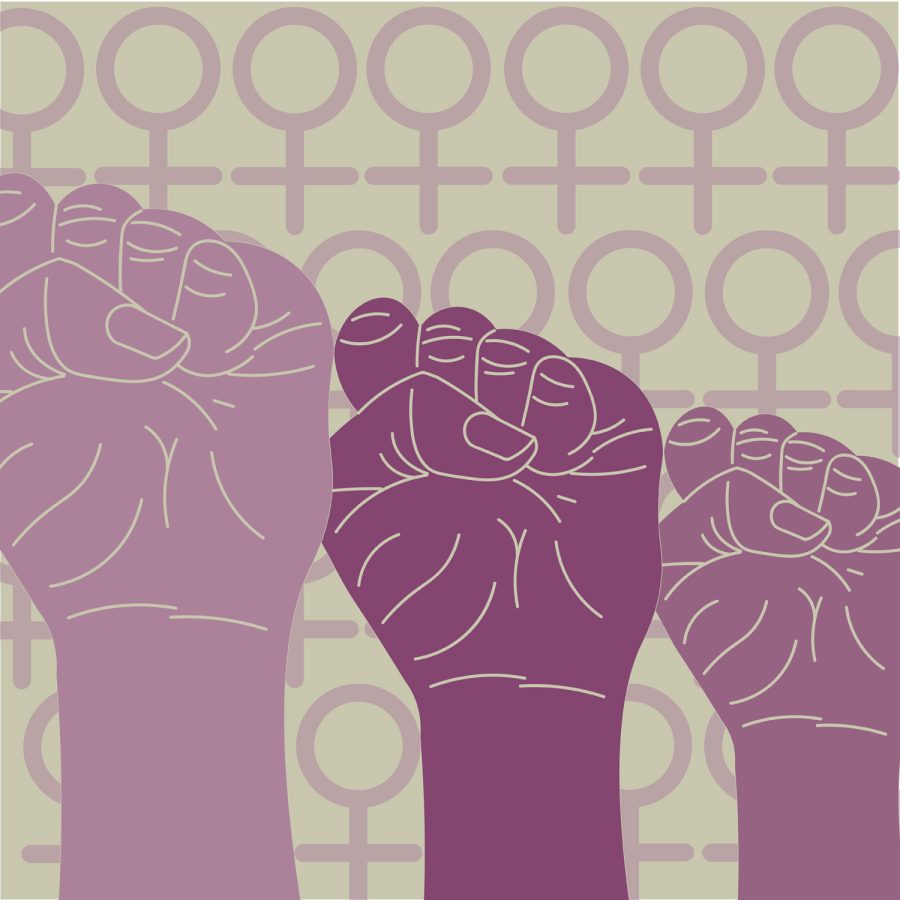Opinion | Femininity is not a weakness
January 23, 2022
Recently I was privy to a conversation in which my partner’s friend — an austere, serious German girl — said she didn’t expect him to be dating someone like me, because I am “just so … sunshiney.”
Obviously, I was offended by this. If you’re a fan of the sitcom “New Girl,” you’ll probably remember the episode in which a girl in high school told Jessica Day that she “rocks a lot of polka dots.” All of the women in the show agree that it is clearly an insult. That’s how I felt about “sunshiney.” In girl talk, it is undeniably an insult.
So I did what anyone would do in that situation — I fumed. My knee-jerk reaction was, “I am NOT sunshiney. I am a strong, intelligent, feminist woman and I deserve to be taken seriously.” I went to the gym in my all-pink matching set and lifted my anger out. But that night, when I went to journal out my feelings, I started asking myself why. Why was I so upset by a single adjective? What about “sunshiney” was so insulting to me? It took me a lot of rage, sore muscles and three handwritten pages to realize the source of my anger — internalized misogyny.
In our society, there is an unspoken synonymization of “femininity” and “weakness.” Gwen Sharp, an associate professor at Nevada State College, discovered that when she searched “weakness” on Thesaurus.com in 2010, the related adjectives included effeminate, effete, feminate and womanly. While these related adjectives no longer appear on the 2021 version of the site, it is undeniable that these associations still permeate through our culture.
We can see this phenomena clearly when we look at male-dominated fields, especially in STEM. In a study from the “Sex Roles” academic journal, female scientists “reported feeling unable to present themselves in a stereotypically feminine manner (e.g., wearing a skirt, expressing emotions) because they … are apprehensive that they will seem unsuitable for a STEM career.” Women have been socialized to hide aspects of their femininity in order to engage in a career that is typically dominated by men. In this way, women are taught that their traditionally feminine traits are weaknesses when trying to achieve their career goals, and subsequently choose to suppress that side of themselves.
Even when looking at the feminist movement, we can see associations of feminine weakness seeping into certain sects. Part of the movement, known as “girlboss feminism,” has received a lot of backlash in recent years for the damaging message that it spreads to young women. “Gilrboss feminism” focuses on women in positions of power, in traditionally male-dominated fields, and encourages the empowerment of the individual woman, even at the expense of other women who may be in her way.
“Girlboss feminism” encourages gender blindness — “Look how successful she is, it doesn’t matter that she’s a woman!” In doing so, it encourages women to adopt stereotypically masculine traits — such as not expressing emotions or presenting a cold exterior — in order to find success in the political and corporate fields. Essentially, women are incentivized to make men overlook the fact that they are women in order to find success. Femininity reminds others that you are a woman, and therefore that you are weak and incapable of holding your own in a male-dominated field.
Femininity is not a weakness. Look at the character Elle Woods from “Legally Blonde,” a Harvard Law student who single-handedly solved a murder case with her knowledge of perm care — and she did it all while wearing pink. While an exaggerated case — you don’t have to express your femininity by constantly wearing pink and high heels — Woods found strength in her femininity. Strength is too often grouped with masculinity, but I believe that true strength is resilience. True strength is vulnerability. Neither of those things are masculine or feminine. Both are human and, frankly, both are hard.
I find incredible strength in my feminine traits. In fact, they’re some of the things that I like most about myself. I am proud of how kind I am, how polite I am, how empathetic I am and how much I smile at people — yes, believe it or not, even smiling is unmasculine. I’m even proud of how damn sunshiney I am.
I think that it’s time for me, and women everywhere, to recognize that just because we’re feminine doesn’t mean that we’re not intelligent, strong or a feminist. I encourage women everywhere to embrace the feminine side of themselves. Your femininity is strong. Don’t let anyone tell you differently.
At the end of the aforementioned “New Girl” episode, Jess Day, after having to pay a fine for braking for birds — yes, even braking for birds is feminine — provides us with one of my favorite quotes, and I’d like to end this column by sharing it with you here. It encompasses much of what I’ve been trying to say, and I don’t think I could say it better than her.
“I brake for birds. I rock a lot of polka dots. I have touched glitter in the last 24 hours. I spend my entire day talking to children. And I hate your pantsuit. I wish it had ribbons on it or something to make it just slightly cuter,” Day said. “And that doesn’t mean I’m not smart and tough and strong. I’m about to go and pay this $800 fine, and my checks have baby farm animals on them, b—ch.”
Anna Fischer writes about female empowerment, literature and art. She’s really into bagels. Write to her at [email protected].








